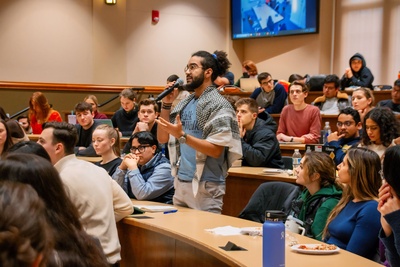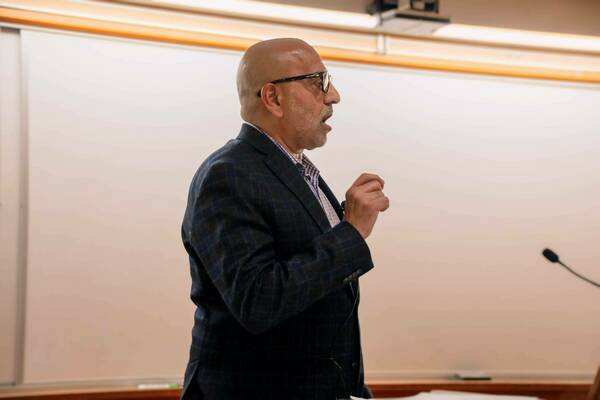Notre Dame Law School event explains the ICJ ruling on South Africa’s genocide case against Israel

At the end of 2023, nearly three months after the Hamas-led October 7 attack on Israel and Israel’s subsequent military response, South Africa submitted a case against Israel to the International Court of Justice (ICJ). South Africa alleged that Israel has committed genocide in Gaza against the Palestinian people in direct violation of the Genocide Convention.
Last month, a group of Notre Dame Law School student organizations — the American Constitution Society, International Law Society, Middle Eastern Law Students Association, and National Lawyers Guild — hosted the event, “Explaining the ICJ Ruling on South Africa's Genocide Case Against Israel.” Professors Mary Ellen O’Connell and Ebrahim Moosa discussed the ruling by the ICJ on South Africa's genocide case against Israel, analyzed its implications, and proposed potential solutions to safeguard the people of Gaza.
O'Connell is the Robert and Marion Short Professor of Law at Notre Dame Law School and Professor of International Peace Studies at the Kroc Institute. Her work lies in the areas of international law on the use of force, international dispute resolution, and international legal theory.
Born in South Africa, Moosa is the Mirza Family Professor of Islamic Thought and Muslim Societies in the Keough School of Global Affairs. His research interests span both classical and modern Islamic thought with a special focus on Islamic law, history, ethics, and theology.

Moosa opened the discussion, addressing South Africa’s request for emergency measures to be taken to protect Palestinians from Israel's alleged breaches of the Genocide Convention in the Gaza Strip. He commended South Africa’s efforts in the ICJ and acknowledged the involvement of Adila Hassim, a JSD graduate of Notre Dame Law School who served as a member of the legal team representing South Africa at the ICJ.
“South Africa has offered a world anguished by the war in Gaza a ray of hope,” said Moosa. “South Africa’s petition for justice and accountability in Gaza lifts despair over this tragedy as a concrete act designed to bring about an end to war crimes.”
He praised South Africa for its visionary leadership, courageous action, and firm commitment to upholding international law, human rights, and global justice, especially as one of the leading countries in the Global South.
“By exercising its clout on behalf of disenfranchised Palestinian populations under Israeli colonial-settler rule, Pretoria (capital of South Africa) serves as a moral beacon,” said Moosa.
O’Connell stated that global calls among political and religious leaders for an immediate ceasefire have intensified as the humanitarian situation in Gaza continues to deteriorate. Like Moosa, she applauded South Africa for modeling for the world how to respond to crises and challenges — by using international courts and other multinational institutions, not war.
“South Africa drew on its own long history of struggle against oppression and its current commitment to international law in stepping up for Palestinians at the International Court of Justice,” said O’Connell. “Bringing the case took courage and Israel made some strong arguments against South Africa. But 15 of the 17 judges of the International Court of Justice ordered that Israel take immediate emergency measures to, among other things, end the killing of Palestinians.”
Last month, O’Connell discussed the Gaza crisis with an imam and rabbi on Beyond Belief, a BBC program on religion. In the episode “Religion and War,” they explored the intersection of religion, politics, and international law when it comes to justifying the use of violence or military action in conflict.

Lehlohonolo January, an LL.M. student from South Africa, attended the event and drew parallels between South Africa and Palestine.
“South Africa’s affinity to international law grew as a result of the support it received from the international community in bringing about an end to apartheid. It thus comes as no surprise that South Africa has turned to international law and the International Court of Justice in an effort to bring to an end the systematic and indiscriminate massacre of the people in occupied Palestine,” said January.
He also commented on the importance of hosting such events at Notre Dame Law School. For January, this particular event had a personal meaning.
“Before enrolling at Notre Dame, I was informed that the LL.M. program in International Human Rights Law came about through an exchange in the 1980s between then-Judge Richard Goldstone and legendary civil rights reformer Father Theodore Hesburgh, C.S.C., who, when asked what Notre Dame could do to promote justice in South Africa, Goldstone responded, ‘Educate our lawyers,’” he said. “In the spirit of this conversation, it is imperative that all Notre Dame lawyers be educated about ongoing global tragedies. Thus, I hope more events of this nature will be hosted by Notre Dame Law School.”